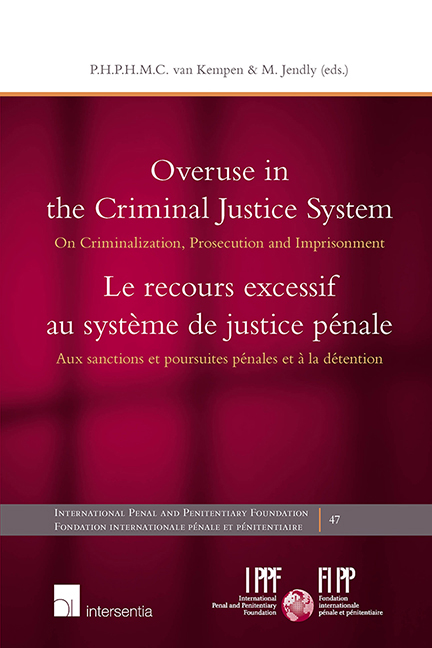Book contents
- Frontmatter
- Dedication
- Contents
- Acknowledgements
- Remerciements
- PART I INTRODUCTORY SYNTHESIS AND ANALYSES 1ÈRE PARTIE. SYNTHÈSE ET ANALYSES INTRODUCTIVES
- Criminal Justice and the Ultima Ratio Principle: need for limitation, exploration and consideration
- La justice pénale et le principe de l'ultima ratio: exigence de limitation, d'exploration et de réflexion
- PART II THEMES 2ÈME PARTIE. THÈMES
- PART III NATIONAL REPORTS 3ÈME PARTIE. RAPPORTS NATIONAUX
- The International Penal and Penitentiary Foundation: history and purpose
- La Fondation internationale pénale et pénitentiaire: histoire et objectif
- The IPPF Series
Criminal Justice and the Ultima Ratio Principle: need for limitation, exploration and consideration
from PART I - INTRODUCTORY SYNTHESIS AND ANALYSES 1ÈRE PARTIE. SYNTHÈSE ET ANALYSES INTRODUCTIVES
Published online by Cambridge University Press: 26 June 2019
- Frontmatter
- Dedication
- Contents
- Acknowledgements
- Remerciements
- PART I INTRODUCTORY SYNTHESIS AND ANALYSES 1ÈRE PARTIE. SYNTHÈSE ET ANALYSES INTRODUCTIVES
- Criminal Justice and the Ultima Ratio Principle: need for limitation, exploration and consideration
- La justice pénale et le principe de l'ultima ratio: exigence de limitation, d'exploration et de réflexion
- PART II THEMES 2ÈME PARTIE. THÈMES
- PART III NATIONAL REPORTS 3ÈME PARTIE. RAPPORTS NATIONAUX
- The International Penal and Penitentiary Foundation: history and purpose
- La Fondation internationale pénale et pénitentiaire: histoire et objectif
- The IPPF Series
Summary
INTRODUCTION
The claim that it is possible to overuse the criminal justice system implies a substantive approach rather than a procedural one. In a procedural approach, the question whether the criminal justice system is violating its limits is principally concerned about whether the criminalization of conduct has been reached through proper application of the legislative process and whether prosecutions and adjudication of criminal cases take place in conformity with criminal procedure law. This volume and its chapters are rather based on a substantive approach of overuse of the criminal justice system, more particularly the overuse of criminalization, criminal prosecution and criminal imprisonment.
Overuse of criminalization – or: overcriminalization – may entail an unnecessary widening of criminal liability (conduct is criminalized without sufficient necessity, offences are constructed too broadly, the statute of limitations for crimes entails overly long periods or extraterritorial jurisdiction is claimed unconvincingly) or an unnecessary deepening of criminal liability (the statutory maximum and/or minimum sentence is set too high). As for an unnecessary widening of criminal liability, this may, for example, manifest itself when the legislator aims to prevent or repress certain conduct through criminalization of that conduct, when it would be more effective or useful to repress or control that conduct fully or at least primarily through operational preventive measures or adopting measures that are of an administrative or civil nature. It may also mean that the legislator has criminalized conduct where it is arguably not useful or necessary or in any event not appropriate to criminalize at all.
Overuse of prosecution primarily means that too many violations of criminal law are prosecuted. This can particularly be the case when in certain individual cases or specific categories of cases it would be more effective, fairer, more efficient or otherwise desirable to refrain from prosecution and/or to repress or control that conduct through other means than prosecution, such as negotiating justice, settlement of the case through other means, including restorative justice possibilities, or administrative fines. Overuse of prosecution can, furthermore, occur through overcharging, i.e. when defendants are charged for offences that are formally applicable but which do little justice to the actual behaviour and its consequences.
- Type
- Chapter
- Information
- Overuse in the Criminal Justice SystemOn Criminalization, Prosecution and Imprisonment, pp. 3 - 22Publisher: IntersentiaPrint publication year: 2019
- 1
- Cited by



